| |
<
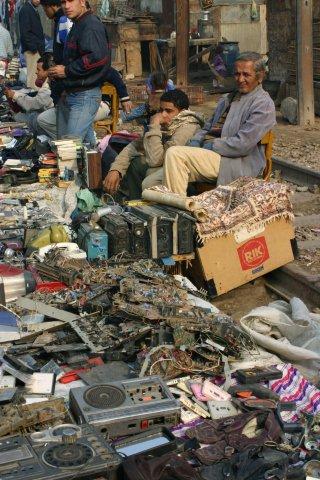
Radio parts, shoes, old telephones, cassettes and much more!
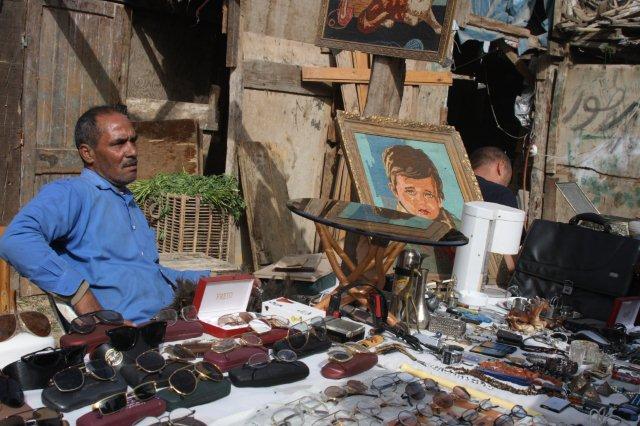
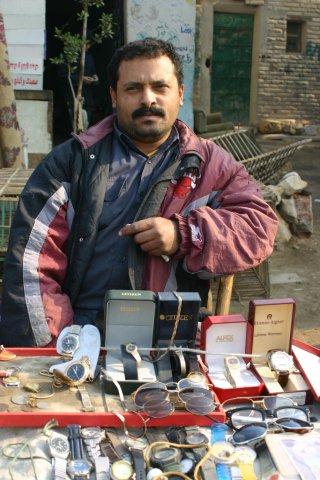
What would you like to have today?
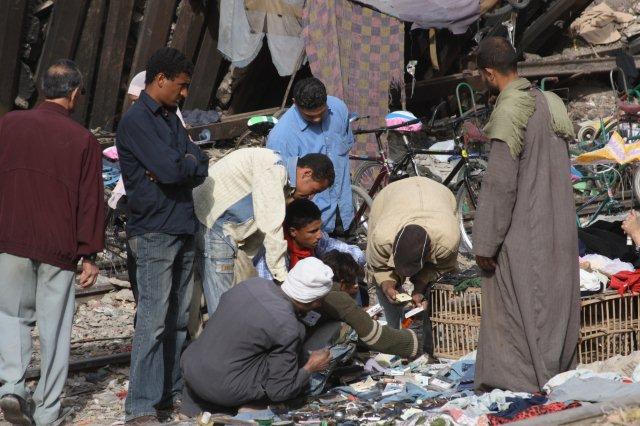
There is customers for anything. Somebody always is in need of the thing.
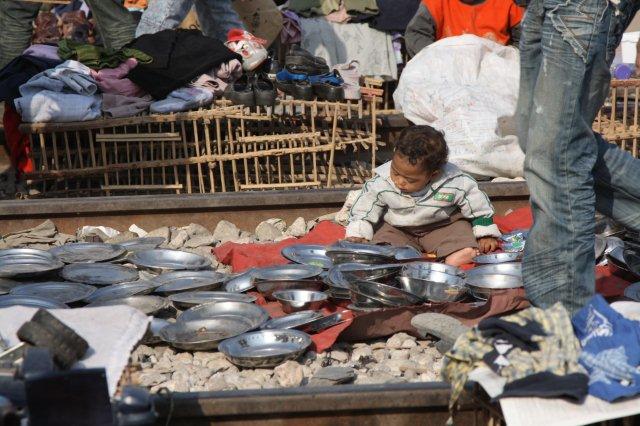
Childred playing among the the things.
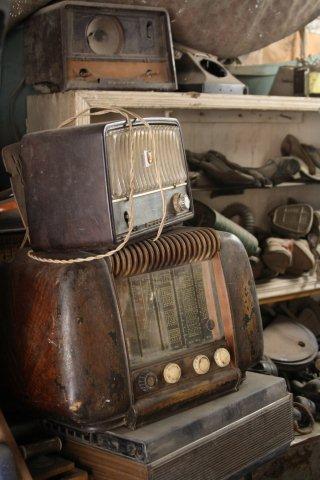
Radios! Anyone?
|
|

Greetings from Cairo part XVII
Published in Ishtar 3/2010
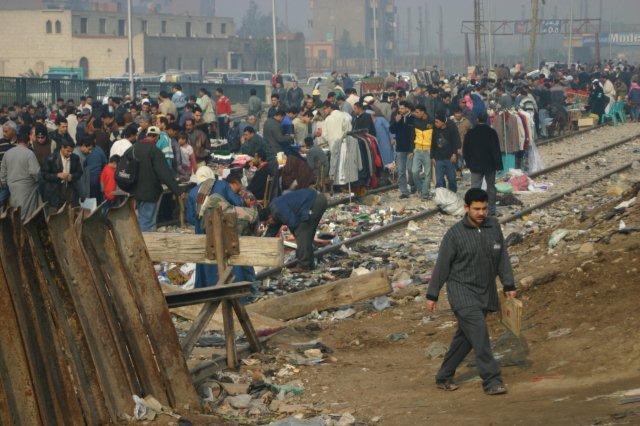
Things, Goods and Stuff
Translated from Finnish by Anu Toivonen
Photos by Päivi Arvonen
The Egyptians are splashing around in a sea of stuff. On one hand, owning things is appreciated, on the other, general carelessness is rife. All the values I learned at home are presented in an entirely different light.
In Egypt, the spectrum of living conditions is wide: the wealthy are stinking rich, the poor are practically penniless. The wealthy make lunchtime shopping trips to Italy or other nearby European countries, if the flight schedules happen to coincide with the days’ plans or with the children’s school schedule. They also have their slightest health problems as well as those of their children treated abroad. The poor grab their few pounds for their daily bread wherever they can and have no energy to even think of anything else. However, there is a lot of shopping potential and power in a nation of 80 million people, so new things are acquired all the time.
Shopping
In Egypt, the most important consideration when buying something is the price: the cheaper the better. A family I know had a new bathroom made and they had a cheap plastic tap installed over the washbasin. Within a month this had broken and eventually, they had a new metallic tap installed, similar to the ones they already had and which had functioned perfectly for many years. On the whole, buying a cheap and malfunctioning product at first turned out to be more expensive than buying the high-priced and endurable one to begin with. This episode well illustrates the Egyptian way of thinking and acting.
A second criterion in choosing a product is the outward appearance: it is important for the clothes, shoes, phones and furniture to look flashy. After living one year in Cairo, I wanted to buy a couple of pots to be able to do some cooking at home. The shop selling utensils had rows and rows of pots and kettles but, unfortunately, Teflon had not yet made a large-scale invasion here. I could see a couple of pots on the top shelf. The first thing I was asked after inquiring about them was whether I wanted the red or the blue set. How am I supposed to know? My food is not interested in the pot’s colour; I’m much more interested in the differences of quality in the lining and the pots in general. When I asked to see the inside of the pot, I was told that the plastic packages could not be opened, so I could only admire tem on the outside. During this exchange, my inquiry kept amazing the shop assistants.
Quality consciousness is not common in Egypt and quality, comfort and safety are not very significant factors in making purchases. Much of the merchandise is of poor quality. All kinds of small items made of plastic are imported from China. The toys are made of plastic and are of ‘throwaway’ quality, as they are broken easily in the children’s activities. You can buy all sorts of things for a couple of pounds and there are a large number of LE2.50 (€0.30) shops where most of the merchandise on offer can be bought for that sum. When it is so cheap, you cannot really expect high quality.
Prestige
In Finland, it is not particularly desirable to stand out in the crowd. You are supposed to belittle your own affairs and possessions in order not to be thought proud; ‘it’s the ugly who need to prance around in pretty clothes’ as my great grandmother used to say.
There are some things you are supposed to belittle also in the Egyptian culture, but otherwise there is no lack of self-esteem. The things belittled include, for example, gifts given to or favours done for other people and food prepared at home by the women. On the other hand, you are not supposed to forget your position in the society, your know-how or a public recognition.
The rich upper class or the famous are expected to spend more than the average citizen. High government officials, big industrial chiefs, foreigners, embassy employees and, naturally, dancers as well as famous actors and singers are considered wealthy and their income is of interest to the people around them. Prestige means upholding and improving your image and showing your wealth and high income. People avidly follow the shopping habits of the wealthy and they also enjoy gossiping about them. It is expected that the clothes, possessions, cars and other paraphernalia of the wealthy are under constant scrutiny and a dancer is not expected to visit second-hand bazaars, ride in a microbus or the metro, buy reduced merchandise or wear the same outfit two days in a row. They are expected to have a large income, so they are also expected to spend a lot of it.
The Egyptians think stinginess is a sin while they also consider being economical to be a better part of wisdom. Sometimes separating the two is difficult: if a wealthy – or someone who is thought to be so – is economical, he is often considered to be stingy which immediately awakens a suspicion of his real wealth or success.
Climbing the prestige ladder
The Egyptian society is extremely hierarchic and everyone has his own place. It is easy to show your income with possessions and even climb a few rungs on the ladder of hierarchy. A fine car, expensive mobile phone and imported goods ensure upholding your image or even improving it. For many people, mobile phones have turned into a black hole sucking money. You have to get the newest model with all the accessories even though you have no need – or indeed money – to keep buying them; a fine mobile phone will give you the desired prestige.
During the past few years, pets have also grown more common. They are one way of showing the family can afford to keep a useless mouth at home. Pets are really more of a commodity rather than family members and their living conditions would make a western pet lover shudder. Even the average age of a pet is relatively low, as the Egyptians are unable to consider and take into account the animal’s natural environment or its well-being but consider the dog or the budgerigar to be more of a living toy. As pets have grown more common and the prestige brought by them has increased, especially thefts of large dogs have increased in number; you either steal one to give prestige to your own family or, more likely, you sell the dog at a local market place.
Recycling and throwaway
Everything can be recycled. The rich buy the product of their choice in all available colours only to end up using one or two preferred ones and giving the rest unused to others; there is always somebody in the family to give things to. Also in the less wealthy families clothes, shoes and everything possible is, in general, given away once the original owner no longer needs them. However, the articles given away are no longer brand new in these families and sometimes they may be very worn down – something that might be considered rubbish in the west. A single article may here circulate in several families.
After Ramadan, during ‘Id, it is customary to buy new clothes for the children. At the same time, it is also customary to give gifts to the servants. Commonly, the lady of the house will choose some of the less desirable pieces of clothing in the family wardrobes and donate these to the servants and their families.
Even though many things are recycled and new things are appreciated, general carelessness is very common. Articles are used until they break, but they are not necessarily cared for. They may not be mended, or if they are, the quality of work is not high, which will usually shorten the time of the item’s usefulness. If the family acquires a newer or better appliance to replace the old one, the fate of the old appliance is no longer of interest.
During the past year, motorcycles have become more common. They are useful both as means of conveyance and as prestige items. It is likely that the family previously used to ride a bicycle, donkey, mule or an ox. After the purchase of the motorcycle, the bike is no longer as important, so any eventual fault is repaired later or not at all. Instead of caring for both the vehicles, so that more family members could use them for moving around at the same time, only the finest – the motorcycle – gets all the prestige and attention.
At the end of the journey
Scrap dealers are an every day sight in almost all districts circulating in their carts and shouting ‘Bikia, bikia’ or the whole word ‘Robabikia, robabikia’ – scrap, scrap. They take all sorts of things: furniture, toilet seats, washbasins, taps, cutlery, scrap metal, broken glass, electronics and household appliances will all end up on their carts. They may pay for the items, but often people also give away all the unwanted scrap
Many Egyptians also think recession-style: nothing must be discarded, as it might be needed later. They are not willing to pay to acquire something they had before and got rid of but, instead, store everything away. Sometimes it is necessary to save some items, as later, it may be impossible to find a replacement – Oh boy, would you then feel angry at former thoughtlessness!
Some items cast away as useless may still find an entirely new life: first, the scrap dealer will check his haul for something useful for himself – and some things may have reselling value for a welcome extra income. Numerous cats live on the scrap heaps on the streets and also stray dogs feed on food scraps. Sometimes, a granny or an old man comes to dig at the heap bringing a flock of sheep along, as green meadows tend to be scarce in the city. Garbage men come to take away the rest on a lorry, going through everything once again and recycling everything possible.
Friday market
Everything possible is reused. In every Egyptian city, there are particular streets reserved for scrap dealers and in some cities there are several of these areas. The most famous shopping heaven for second-hand items is Suq El Goma, the Friday Market. Every Friday, it spreads out on the streets in or near the City of the Dead, which is a large cemetery in central Cairo housing hundreds of thousands of people. You can find almost anything at this huge market and there are special areas for selling clothes, tools, antique, furniture, food, flowers, pets and even cars. Most of the items on sale are second-hand but some vendors also sell brand new merchandise. In all likelihood, there are also stolen items here: for example, stolen dogs, mobile phones, batteries and similar goods all fit in. However, many Egyptians never visit these market areas as they are clearly for the poorer populace, and going there feels scary. Most of the vendors and customers are men; only a small number of them are women, as the men of the family do not consider these places safe for the women. At Suq El Goma you can see that everything can be sold as long as the price is right. Old telephones, radio parts, old spectacles and everything imaginable are presented side by side to tempt buyers.
Living in a strange culture, you necessarily end up re-evaluating your own customs and behaviour. From the Finnish point of view, many things are done ‘wrong’ here in Egypt. However, I would be unable to live in these conditions on the same terms that many locals happily manage to spend their whole lives. On one hand, people here appreciate possessions and the prestige they bring on the other, they treat those same possessions negligently and carelessly. I find that extremely contradictory behaviour.
|
|